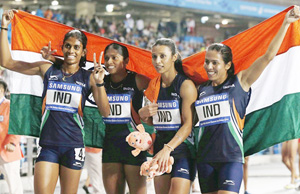Geneva, Mar 19: Regional Olympic officials are rallying around the IOC and have backed its stance on opening the Tokyo Games as scheduled, as direct criticism from gold medalist athletes built amid the coronavirus outbreak.
Leaders of continental Olympic groups praised the IOC after a conference call Wednesday to update them on coronavirus issues four months before the opening ceremony in Tokyo on July 24.
"We are living through an unpredictable crisis and as such, it is important that we have one policy, expressed by the IOC, and we follow that policy in unison," the Italy-based European Olympic Committees said.
However, when the International Olympic Committee published an interview with its president, Thomas Bach, after a separate call with athlete representatives, it prompted a four-time Olympic champion to urge postponing the games.
Bach acknowledged that many athletes were concerned about qualifying events being canceled, but noted that there were still four months to go until the games are set to be opened.
"We will keep acting in a responsible way in the interests of the athletes," Bach said.
British rowing great Matthew Pinsent wrote on Twitter that the comments from Bach, his former IOC colleague, were "tone deaf."
"The instinct to keep safe (not to mention obey govt instructions to lock down) is not compatible with athlete training, travel and focus that a looming Olympics demands of athletes, spectators organisers," Pinsent wrote.
Responding to the criticism from Hayley Wickenheiser, a four-time Olympic hockey gold medalist, the IOC said it was "counting on the responsibility and solidarity of the athletes."
Members reinforce faith in IOC
The IOC repeated its steadfast stance after a conference call with sports governing bodies, many of which have not completed qualification events for Tokyo.
"There is no need for any drastic decisions at this stage; and any speculation at this moment would be counter-productive," the IOC said.
That message was repeated after Wednesday's conference call by IOC executive board member Robin Mitchell, the interim leader of the group of national Olympic bodies known as ANOC.
"We share the view that we must be realistic, but not panic," Mitchell said in a statement released by the IOC on behalf of the Oceania Olympic group.
Offering unanimous support for the IOC's efforts to resolve qualification issues, the 41-nation Pan-American group noted challenges facing potential Olympians.
Australian Olympic Committee chief executive Matt Carroll said his organized recognized there was a global health crisis, but equally was assured by the IOC that the games would go ahead.
"We recognize people are suffering -- people are sick, people are losing jobs, businesses are struggling amid enormous community uncertainty. Things are changing everyday and we all must adapt," Carroll said.
"We owe it to our Australian athletes to do everything we can to ensure they will participate with the best opportunity in those Games."
Australia's team delegation leader said the focus now was "moving to the planning of our pre-Games preparation to ensure we get our athletes to the Games healthy, prepared and virus free."
"Clearly that is a major challenge for all National Olympic Committees," he said.






Comments
Add new comment